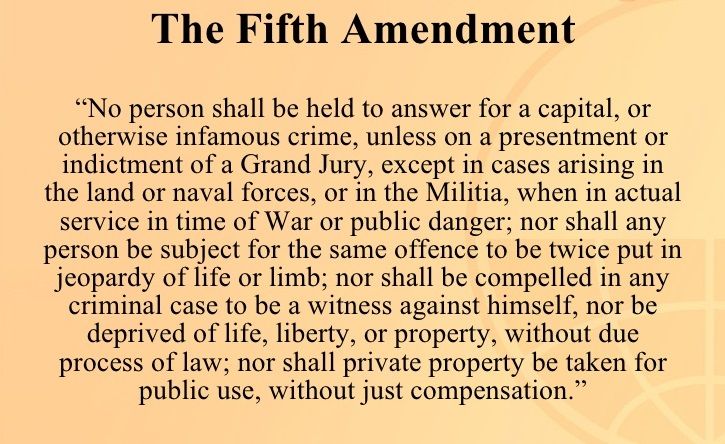Fifth Amendment – Amendment V
Fifth Amendment
The Fifth Amendment protects the right to private property in two ways. First, it states that a person may not be deprived of property by the government without “due process of law,” or fair procedures. In addition, it sets limits on the traditional practice of eminent domain, such as when the government takes private property to build a public road. Under the Fifth Amendment, such takings must be for a “public use” and require “just compensation” at market value for the property seized. But in Kelo v. City of New London (2005), the Supreme Court interpreted public use broadly to include a “public purpose” of economic development that might directly benefit private parties. In response, many state legislatures passed laws limiting the scope of eminent domain for public use.
if you are a landlord suffering from tenants who refuse to pay due to SOME COVID-19 ORDINANCE after March 1, 2022 should read this
No person shall be held to answer for a capital, or otherwise infamous crime, unless on a presentment or indictment of a Grand Jury, except in cases arising in the land or naval forces, or in the Militia, when in actual service in time of War or public danger; nor shall any person be subject for the same offence to be twice put in jeopardy of life or limb; nor shall be compelled in any criminal case to be a witness against himself, nor be deprived of life, liberty, or property, without due process of law; nor shall private property be taken for public use, without just compensation.
Fifth Amendment
The Fifth Amendment creates a number of rights relevant to both criminal and civil legal proceedings. In criminal cases, the Fifth Amendment guarantees the right to a grand jury, forbids “double jeopardy,” and protects against self-incrimination. It also requires that “due process of law” be part of any proceeding that denies a citizen “life, liberty or property” and requires the government to compensate citizens when it takes private property for public use.
Primary tabs
Amendment V
No person shall be held to answer for a capital, or otherwise infamous crime, unless on a presentment or indictment of a grand jury, except in cases arising in the land or naval forces, or in the militia, when in actual service in time of war or public danger; nor shall any person be subject for the same offense to be twice put in jeopardy of life or limb; nor shall be compelled in any criminal case to be a witness against himself, nor be deprived of life, liberty, or property, without due process of law; nor shall private property be taken for public use, without just compensation.
Wex Resources
- Fifth Amendment
- Criminal Law / Criminal Procedure
-
Due Process
-
Substantive Due Process
- Miranda Warning
- Indictment
- Privilege Against Self-Incrimination
- Self-Incrimination
- Grand Jury
- Jury
- Double Jeopardy
- Collateral Estoppel
- Immunity From Prosecution
- Eminent Domain
- Takings
- Territorial Jurisdiction
Other Resources
CITED FROM https://constitution.congress.gov/constitution/amendment-5/



